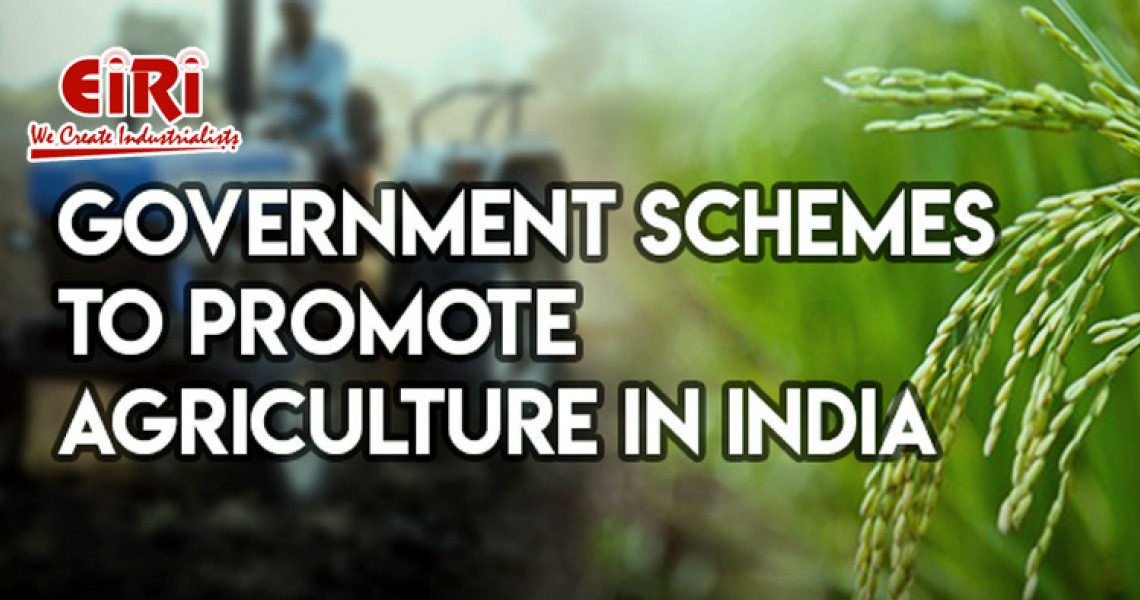Government Schemes for Agriculture Industry in India

India's agriculture sector is a crucial part of its economy, employing a significant portion of the population and contributing substantially to GDP. To support and enhance this sector, the Indian government has introduced various schemes aimed at improving productivity, ensuring sustainability, and boosting farmers' incomes. Below is a detailed overview of some of the key government schemes for the agriculture industry in India.
Pradhan Mantri Kisan Samman Nidhi (PM-KISAN)
The Pradhan Mantri Kisan Samman Nidhi (PM-KISAN) scheme provides direct income support to farmers. Under this scheme, small and marginal farmers receive ₹6,000 per year in three equal installments. This financial assistance helps farmers to manage their agricultural expenses and ensure economic stability. The scheme aims to support around 120 million farmers across the country.
Pradhan Mantri Fasal Bima Yojana (PMFBY)
Launched in 2016, the Pradhan Mantri Fasal Bima Yojana (PMFBY) is a crop insurance scheme designed to mitigate risks associated with agriculture due to natural calamities, pests, and diseases. It provides financial support to farmers in the event of crop loss or damage, ensuring their economic well-being. The scheme has a low premium rate for farmers, making it affordable and accessible.
Pradhan Mantri Krishi Sinchai Yojana (PMKSY)
The Pradhan Mantri Krishi Sinchai Yojana (PMKSY) aims to enhance water availability for agricultural purposes through efficient irrigation practices. The scheme focuses on providing water to every field, improving water-use efficiency, and promoting sustainable water conservation practices. PMKSY is divided into several components, including Accelerated Irrigation Benefit Programme (AIBP), Har Khet Ko Pani, Per Drop More Crop, and Watershed Development.
Soil Health Card Scheme
The Soil Health Card Scheme was launched in 2015 to promote soil health management. Under this scheme, soil health cards are issued to farmers, containing information about the nutrient status of their soil and recommendations on appropriate dosage of fertilizers. This initiative helps farmers to use fertilizers judiciously and improve soil fertility, ultimately enhancing crop productivity.
e-National Agriculture Market (e-NAM)
The e-National Agriculture Market (e-NAM) is an online trading platform for agricultural commodities, launched in 2016. It aims to create a unified national market for agricultural produce by connecting existing APMC (Agricultural Produce Market Committee) mandis. Farmers can sell their produce directly to buyers across the country, ensuring better price discovery and reducing market inefficiencies.
Paramparagat Krishi Vikas Yojana (PKVY)
The Paramparagat Krishi Vikas Yojana (PKVY) promotes organic farming and sustainable agricultural practices. The scheme encourages farmers to adopt traditional and organic farming methods, reducing dependency on chemical fertilizers and pesticides. It provides financial assistance to farmers for organic certification, training, and input costs, supporting the growth of organic farming in India.
Kisan Credit Card (KCC)
The Kisan Credit Card (KCC) scheme was introduced to provide timely credit to farmers for their agricultural needs. It offers flexible and affordable credit facilities to meet short-term crop loan requirements, post-harvest expenses, and allied agricultural activities. The scheme simplifies the credit process and ensures that farmers have easy access to financial resources.
National Food Security Mission (NFSM)
The National Food Security Mission (NFSM) aims to increase the production of rice, wheat, pulses, coarse cereals, and commercial crops. The mission focuses on improving farm productivity, restoring soil fertility, and promoting the use of high-yielding varieties. It also provides financial support for agricultural inputs, including seeds, fertilizers, and farm machinery.
Rashtriya Krishi Vikas Yojana (RKVY)
The Rashtriya Krishi Vikas Yojana (RKVY) is a state-specific scheme that provides financial assistance to states for developing agriculture and allied sectors. The scheme aims to ensure comprehensive development of agriculture by addressing state-specific needs and priorities. It covers various components, including crop development, horticulture, livestock, fisheries, and agricultural mechanization.
Atmanirbhar Bharat Abhiyan - Agriculture Infrastructure Fund
Under the Atmanirbhar Bharat Abhiyan, the Agriculture Infrastructure Fund was launched to provide financial support for building infrastructure in the agriculture sector. The fund focuses on developing post-harvest management infrastructure, including cold storage, warehouses, grading, and packaging units. It provides medium to long-term debt financing through interest subvention and credit guarantees.
Conclusion
The Indian government has implemented a range of schemes to support the agriculture sector, ensuring sustainable growth and improving the livelihoods of farmers. These schemes address various aspects of agriculture, from financial support and crop insurance to water management and market access. By leveraging these initiatives, farmers can enhance productivity, adopt sustainable practices, and secure better incomes. The continued focus on agricultural development through these schemes is essential for achieving food security and economic stability in India.










